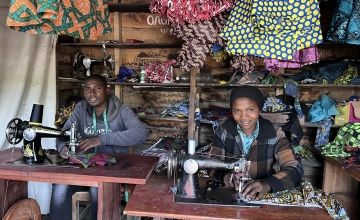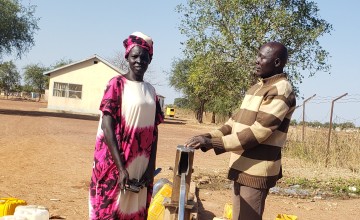
Read our 2023 annual report

Knowledge Hub
We speak to Concern’s Equality Adviser Adèle Fox about, among other things, the use and availability of contraception in some of the world’s most vulnerable communities.
At Concern, part of our role on the communications team is to monitor our social media channels and engage with the wider community about our work.
We do our utmost to respond to every genuine question that we are asked, whether it’s to do with our appeals, our programmes in vulnerable communities, how the business operates from a logistical and financial point of view, or any other queries that may arise through Facebook, Instagram, X (formerly Twitter), TikTok or LinkedIn.
Subjects that we’ve seen mentioned on these platforms with increasing regularity centre on family size and birth control, and specifically whether Concern advocates for the increased use of contraceptives in countries that may be struggling with economic or social issues.
Responding to people who say women should ‘stop having children’
There’s a short answer to this, and a longer answer.
The short answer is that we, as an organisation, would never dictate to anyone what choices they should make. Equality is an absolute, in our eyes, and we don’t believe that any one person has the right to tell another person what they should do with their body. In a perfect world, a person’s bodily autonomy would not be subject to geographical, social, religious or economic factors.
Sadly, however, we do not live in a perfect world.
For the longer answer, we spoke to Adèle Fox, our Equality Adviser, who explained the nuances around the work Concern does to support women and men in family planning.
“It is often not a woman's choice, alone, about how many children she has,” Adèle explains.
"In a lot of contexts, it's the men who hold the decision-making power on this.
"I did an analysis on this in Burundi when I worked there in 2012, and that brought out the main barriers to women using contraception.
“They were 1. their husbands and, 2. the church.
"There are a lot of reasons that women - even if they had the necessary health education - won't be able to put contraception into practice. There are these social barriers. They can't make these decisions in a vacuum.”
Understanding power dynamics within couples

With men, in a lot of cases, holding all the power within their households, women may decide to secretly take steps to avoid having more children.
"The first thing is to understand the power dynamics that go on within the household,” Adèle says.
“Some women will tell us that they use contraception in secret from their husbands. They might go and have an injection or something that can be hidden from their husbands because their husbands wouldn’t permit them if they knew.
"There's not that level of communication between them, where they can discuss why they may or may not want to have any more children. Understanding the power dynamics is a big thing.”
While in Ireland it’s not unusual for couples to make life-changing decisions together, that is not always the case in countries where different social and economic factors exist.
This is a multi-faceted issue, where the culture of the particular community comes into play, as well as the belief that having more children may lead to financial security into the future where there may not be any social security system in place.
There may also be a lack of education around contraception, as well as the absence of family planning-oriented supplies and services.
“Even if they have the best will in the world not to have more children, and their husbands [agree], [this option] might not be available to them anyway,” says Adèle.
We can’t force women to do anything
There is “no quick fix” in situations where gender inequality and harmful gender norms exist, adds Adèle.
"There are all kinds of other things going on, like early marriage where the 'woman' has absolutely no authority to make any decisions because she's a child.
"We need to be aware that those are some of the factors that are involved, and therefore there isn't a quick fix. [Any work that needs to be done to change this] has got to be something that's sensitive and culturally appropriate.”
Addressing gender norms between couples

Forcing our own beliefs on others is, Adèle insists, just another form of discrimination.
"Our approach needs to be something that doesn't force women to do anything but gives them a way to think about things differently, as well as - importantly - their partners. Some of the ways we do this are these gender-transformative dialogues, whether it's fathers' groups, mothers' groups or couples together."
As part of Concern’s gender-transformative work in the area, across many countries, we often talk with couples about gender norms.
We ask questions such as who does what in the household? Who has the power to do what in the household? Who makes the decisions? What works well, and what doesn't?
We suggest that, in thinking about their own roles in terms of gender inside the home, outside the home and in their relationships with others, people really challenge existing gender norms that they’ve grown up believing.
"This is the process and then you come to these sensitive topics, around birth spacing and family planning, and you might ask them to think about the advantages of having fewer children. We ask them, 'who makes that decision? How do you think it makes the other one feel?'
"These are ways to get people to think it through themselves and to come to their own decisions.”

Other ways to help
Corporate support
Is your company interested in working together for a common cause?
Fundraise for Concern
From mountain trekking to marathon running, cake sales to table quizzes, there are lots of ways you can support our work.
Buy a gift
With an extensive range of alternative gifts, we have something to suit everybody.
Leave a gift in your will
Leave the world a better place with a life-changing legacy.
Volunteer with Concern
The lots of ways to get involved with our work as a volunteer
School fundraising
Without the generous support from schools, we wouldn't be able to do the work that we do.

